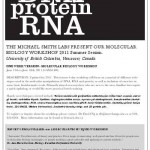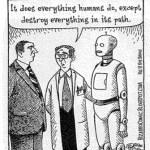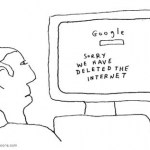Ethics Palace: Where ethical questions go to live or die
(You can follow Dave on twitter @dnghub)
30 MINUTES, 70 FATES.
You don't know it, but as I write this piece, there is some serious procrastination going on. My attention span is weak and sidetracked constantly by a variety of diversions, and if you must know, it's taken me close to half an hour to write these first two sentences. Still, one could argue that none of us are strangers to procrastination, and 30 minutes is relatively short - only a minor instance of time in the grand scheme of things.
But a lot can happen in thirty minutes. Earlier, I had been looking over some 2009 UNAIDS…
It's election time again and, as is the norm, we see teachers using the opportunity to talk to their students about things such as Prime Ministers, parliaments, senates, and, well, basically - how this thing we call the "Canadian Government" is meant to work. My own daughter who is in Grade 4 is in such a class, and has been asking me all sorts of questions: the most prevalent of which is "Who is Alice Wong?" Not a surprising question, since her face is fairly ubiquitous in Richmond, BC where I live, being set against the many blue Conservative signs and placards (she is our incumbent MP…
I just noticed that there's a workshop being offered from June 13th to June 18th, 2011, in Vancouver, Canada, that provides technical and hands-on training for "scientists and non-scientists interested in human cloning." This course has a price tag of $1400 (does not include transportation, room and board) and apparently provides the following:
"This professional course (which can accept only 12 clients) will guide participants through the various methodologies involved in the production of a human clone. This includes extensive lectures on the various techniques as well as a significant…
(Reprinted from Boingboing)
Access to life-saving medicines is not a luxury, but a human right.
~Canadian HIV/AIDS Legal Network
To me, the above statement is one of those things that sound like a no-brainer. Put another way, if I were to ask you whether you thought a person's income should determine whether they live or die from something like HIV/AIDS, then I think you would see that the answer is nothing but obvious. But here I am, in Canada, writing this post, because there is a very real danger that members of my government think that this isn't such an easy decision after all - that…
Speaking of robots: you might be interested in the types of "deep thoughts" they have.
@dnghub Twitter Feed
Most people know that Google's informal tagline is "Don't be evil." In fact, that phrase comes with a little background, nicely described at Wikipedia:
"Don't be evil" is the informal corporate motto (or slogan) of Google,[1] originally suggested by Google employees Paul Buchheit and Amit Patel at a meeting. Buchheit, the creator of Gmail, said he "wanted something that, once you put it in there, would be hard to take out," adding that the slogan was "also a bit of a jab at a lot of the other companies, especially our competitors, who at the time, in our opinion, were…
Me again. I once put up a post on the problems with trusting the safety of energy producing systems. The post was not well received; I see as I re-read the comments that I was particularly irritable about it. But I find the point I was trying to make way back when captured better in the editorial cartoon below:
I just noticed talks are up from the TEDxVancouver event I attended a little while back. At the time, I mainly focused on one particular speaker who was a Climate Change denialist, but now that the talks are up, I thought it fitting to highlight what I thought was one of the strongest talk (sort of the one where folks kind of went, "whoa - that's cool").
Of course, this had to do with video games, specifically a show and tell of some of the remarkable software mechanics behind the sport game titles produced by Electronic Arts. Anyway, the fellow talking is one Henry LaBounta, who happens…
Hmmm... this should be interesting...
To follow the physical laws of the universe (on twitter), click here. (O.K. back to work)
Lately I've been wondering if everything going on in the world of climate change has been done just for the benefit of ASIC 200, a course I co-teach which goes into the heady arena of climate politics. It's like you can't make this stuff up.
Just hot off the presses at the Guardian is news about a leaked document called "The Danish Text." It's essentially a primer document made to help speed things along at Copenhagen, but its optics also look like that of a "let's see if we can move the process out of the UN and into the hands of the more affluent countries."
The Guardian points out that:…
(hattip to Nick at terry.ubc.ca)
This would be the headline from 25 years ago at Bhopal, India, when the Union Carbide plant there leaked a toxic cloud of methyl-isocyanate. My headline is indicative of the complexity of this disaster: the causes, responses, and historical path since then of regulation, cross-national legislation, and corporate attempts (or lack thereof) at responsibility to the communities where they operate are not straightforward. The company in question, Union Carbide, attempted at the time to claim it wasn't their fault (that it was sabotage). Never mind that a mere six months later, a similar…
In "A hill of beans," The Economist reports that "the average American wastes 1,400 kilocalories a day." For those who would argue for industrial solutions to our food and agricultural problems because 'how else will we feed the world?,' I would argue that we first tackle problems of waste. Over-consumption leads to the problem of waste production . . . as pointed to by the study by "Kevin Hall and his colleagues at the National Institute of Diabetes and Digestive and Kidney Diseases," as reported in the article linked above.
Let's call this a public service announcement:
Wendell Berry will be visiting the University of Virginia in early December. He is the first in a series of four speakers for U.Va.'s Brown College Visiting Environmental Writer and Scholars (ViEWS) Lecture Series, 2009-2010. (As it happens, Rebecca Solnit, the subject here, is the third speaker in the series, next February; not to mention poet and philosopher Gary Snyder, next Spring.)
Berry will be giving a public reading at 5:30 PM on Thursday, December 3rd in the Small/Harrison Special Collections Library on campus. I'm told a reception…
Is It Possible to Eat Sustainably at the University of Virginia?
Eating sustainably requires (a) that you come to some resolution about what "sustainable" means, (b) that you have the opportunity to choose so-defined sustainable foods, and (c) that the constraints of your lifestyle, geography, and socioeconomic context make it possible for you to pursue such an endeavor. Threading the needle between all of that is tricky business. Thus many have chosen to run experiments about it, or related to the larger theme, defined in various ways: the "week without" processed food; the "week without"…
This chart about the lack of resolution to some basic problems in Africa -- between solutions proposed in 1938 to those from 2005 -- fascinates me not only for the info it presents but for the range of responses it has elicited. It is a chart from a working paper by William Easterly, a professor of economics at NYU.*
Here is the abridged version posted by Easterly at this blog:
(
Click here
for the full version from Easterly's paper.)
Also see the interpretations of the data set at Reason.com and then at the blog Marginal Revolution. The lack of resolution to the above problems,…
A review of Cocktail: A Play about the Life and HIV Drug Development Work of Dr. Krisana Kraisintu by Vince LiCata and Ping Chong
Truth be told, I don't read plays very often, if at all. In fact, I'm ashamed to admit that I think the last one I read was back in high school long ago, and if I remember correctly had something to do with vampires - ironic in that vampires at the time were not so popular. But this play was about something I am interested in - medicine and social responsibility - and it was referred to by a friend, who also happened to be one of the authors.
Coincidentally,…
First, take a quick peek at this Gapminder.org video for a general sense of the problem:
Now, this video is from May 2009, after the first few weeks of the initial outbreak, and it also has a focus on media representation, but with the recent worry over potential variants of the H1N1 virus rearing in the next little while, a similar issue has come up.
This time concerning the number of dollars spent on mitigating a potential health crisis.
More specifically: How, if in the face of serious health concerns, can developed countries suddenly find the will to fund major health initiatives (and…
I had the chance to interview Rebecca Solnit for The Believer. It's on shelves now, in their September issue. They've also put the full text of it on-line at their website. (Here it is.)
To quote the interview's intro, Solnit is the author of twelve books. She is a journalist, essayist, environmentalist, historian, and art critic; she is a contributing editor to Harper's, a columnist for Orion, and a regular contributor to Tomdispatch.com and The Nation; she's also written for, among other publications, the L.A. Times, the San Francisco Chronicle, and the London Review of Books.
She talks…
Part 1 | Pt. 2 (below) | Pt. 3
---
Part 2 with Julie Sze, discussing her book Noxious New York, follows below. All entries in the author-meets-blogger series can be found here.
WF: Let's do this: I know we already brought up environmental justice before, but could you define it in your terms for the readers? In your use and experience, does it differ from environmental racism, does it differ from, say, an anti-toxics activism that some link to Love Canal and Lois Gibbs?
JS: That is a huge question in the book. I define environmental justice as the social movement that emerged in response…





